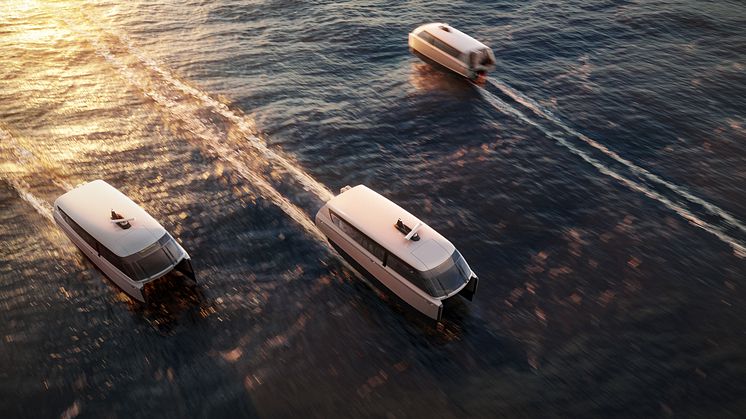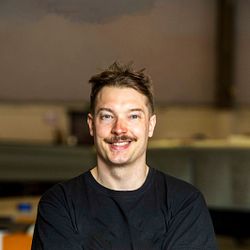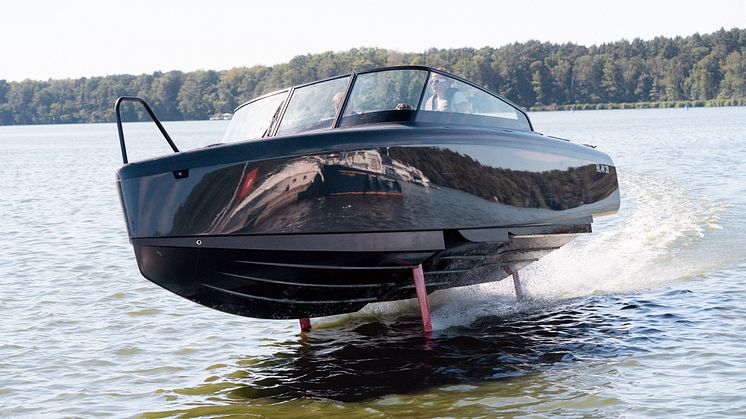
Press release -
Seattle's 'Mosquito Fleet' Could Return – Now Electric and Flying
SEATTLE, WA – September 13, 2023
(Media test rides available, see below)
At the turn of the 20th century, the 'Mosquito Fleet' steamships of Puget Sound served as a vital transport network. They provided frequent, fast, and flexible services between various cities and rural communities before the rise of cars and railroads.
"Most transportation here was done by boats. Then land-based transport took over because it was faster and cheaper. Now we're changing all that again," said Gustav Hasselskog, CEO of Candela.
Unlike the dirty steam ships of yesteryears, his tech company produces the world's first electric hydrofoiling vessels—computer-guided ships with wings slung under the hull that cut energy usage by 80% compared to conventional vessels. This enables longer electric range, greater speed, and significant savings in operational costs over diesel ships. Additionally, they produce no wake, making them eligible for exemptions from speed limits, as demonstrated in Candela's hometown of Stockholm. There, a new Candela P-12 ferry is set to reduce rush hour commute times from 50 minutes by car to 25 minutes by foiling ferry.
"In many cities, the most direct commute is often over water. Still, because of the high cost and slow vessels, the waterways are almost empty. We want to make them into green corridors for high-speed transport ," said Gustav Hasselskog, CEO of Candela.
Candela's P-12 Shuttle on Seattle’s Popular Routes
Next week, Candela visits Seattle to showcase their demonstrator craft to customers and media, and how their foiling electric ferries could transform popular routes. For example, the efficiency of the P-12 Shuttle could make the Seattle-Bainbridge Island commute up to ten minutes faster than current options. It could also pave the way for new routes like a direct link to Magnolia or West Seattle, which could be completed in just 13 minutes and offer up to 15 departures within a 12-hour period.
Deploying the P-12 Shuttle on Lake Washington could establish several new direct routes between shores, reducing road congestion and improving local air quality.

The Candela C-8 technology demonstrator showcases the efficiency of electric hydrofoiling. By flying above the surface, it uses 80% less energy than conventional boats and achieves long electric range at high speed.
Sustainable Transport at a Low Cost
Like all Candela vessels, the new P-12 Shuttle is powered by hydrofoils that lift the hull out of the water, allowing for a smooth and efficient ride at speeds of 30 knots. The vessel is stabilized by its Flight Controller, a computer system that uses sensors to scan the surface ahead and adjust the hydrofoils' angle of attack in real-time, accounting for waves and wind. The result is a silk-smooth ride even in adverse conditions, minimizing sea sickness.
"It's a magic carpet ride. It's incredibly quiet and smooth, more akin to a sailplane than anything else. Once you've tried it, it's hard to go back to traditional boating," says Gustav Hasselskog.
Traditionally, waterborne transport has been expensive to operate because diesel ships consume vast amounts of fuel. However, the reduced drag and the efficient C-POD electric drivetrain of the P-12 mean that it uses the same amount of energy per passenger as a hybrid electric bus. This makes the electric ship competitive with land-based transport in terms of operating costs.
Candela envisions a system for waterborne transport that's similar to a bus-line. Today's diesel ferries, many of which are designed for peak demand accommodating hundreds of passengers, often operate far below capacity. In contrast, the P-12 can transport 30 seated passengers and has space for bikes or wheelchairs, mirroring the functionality of a city bus.
"Replacing a few larger vessels with a flexible fleet of many smaller ones results in a waterborne transport system with more frequent departures. This offers more direct lines and introduces new routes that don't currently exist," says Hasselskog.
It's reminiscent of Seattle's Mosquito Fleet from days gone by – but modernized, electric, and flying.
Candela will demonstrate its foiling electric technology to the media at Bell Harbor Marina and Lake Washington starting on Wednesday, Sept. 13, through Sunday, Sept. 17. To schedule a test ride, please contact:
Mikael Mahlberg
Head of Communications
Candela
Email: mikael.mahlberg@candela.com
Phone: (+46)765376678
For more information about Candela's P-12 Shuttle and plans to revolutionize waterborne commuting, please visit www.candela.com.
Related links
Topics
Stockholm-based Candela Technology AB is the world leader in hydrofoiling electric vessels. The company was founded in 2014 by engineer and business leader Gustav Hasselskog with the mission to accelerate the world's transition to fossil fuel-free lakes and oceans by developing electric vessels that outperform those powered by fossil fuels.
Candela's watercraft have wings (hydrofoils) that lift the hull above the water and reduce friction, using 80% less energy than conventional ships at high speed. This technology allows for long-range water travel solely on battery power, a first in the industry. Candela's hydrofoils also enable operators to transition to sustainable fleets by providing up to 50% lower operational costs.
At the heart of Candela's hydrofoil tech stack is the Flight controller, which automatically stabilizes the vessel during flight by regulating the foils, using sensors that gauge wave height and wind speed, among other factors. Even in rough weather, passengers experience 90% less g-forces than they would on a traditional boat. All Candela vessels are fully connected and receive over-the-air updates.
After five years of research and development, Candela began producing the world's first electric hydrofoil leisure boat in 2019, the Candela C-7 open "roadster of the seas". This was followed in 2021 by the high-volume market Candela C-8, which will be delivered to the first customers in spring 2023. Over 150 C-8 units have been sold to date, and the vessel has been lauded as a "game changer" by Motorboat and Yachting magazine, winning numerous awards including the 2022 European Powerboat of the Year award for its superior seakeeping, long range, and high speed.
In 2023, Candela is launching its first commercial vessel, the Candela P-12 Shuttle ferry. It is poised to set multiple world records for being the fastest and longest-range electric ship ever built, with a top speed of 30 knots and a range of up to 60 nautical miles. It will also be the most energy-efficient fast ship ever made in its size class. Substantial operational cost savings are expected. The first unit is water launched during summer 2023.
Candela is a technology company with headquarters in Stockholm, Sweden, employing over 200 engineers, technicians, and production staff. The company develops the entire tech stack, from the C-POD motor to the control system and carbon fiber hulls, in-house. Candela's two wholly-owned factories in Stockholm, Sweden, produce the Candela C-8 and P-12 vessels. The company also has leisure boat resellers in 12 countries and wholly-owned sales offices in San Francisco, USA, and Cannes, France.



